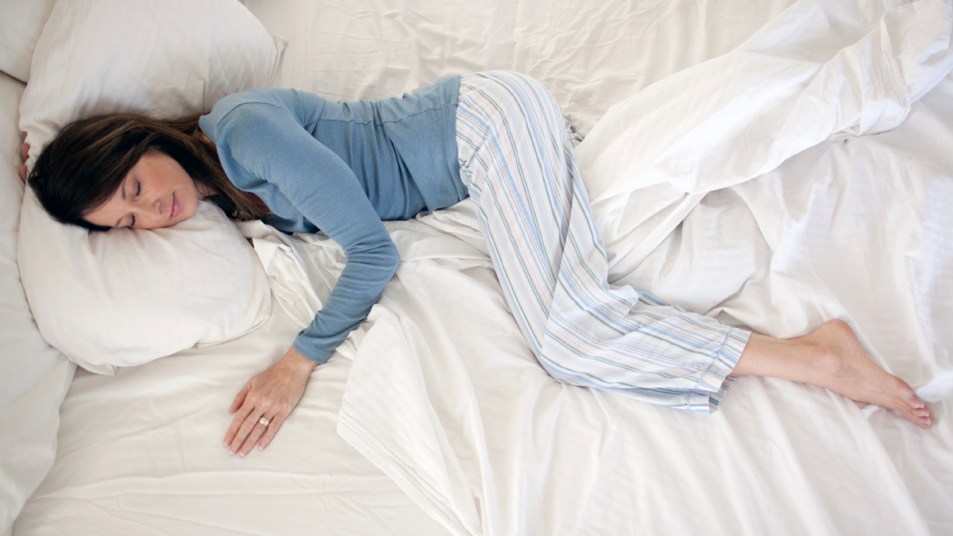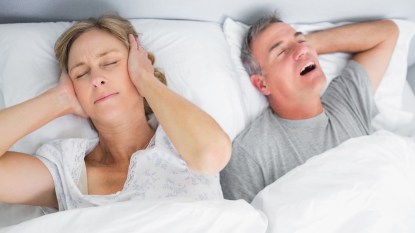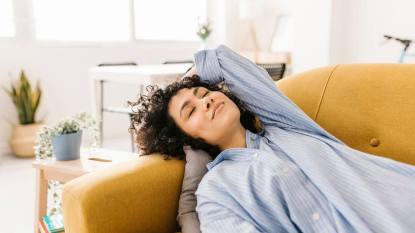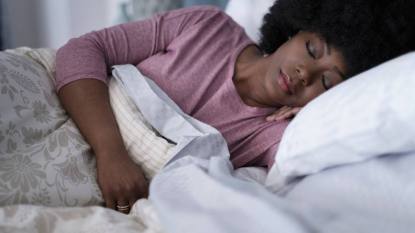From Strawberries to Socks: 3 Surprising Ways to Calm Restless Legs and Finally Sleep Through the Night
These natural remedies soothe symptoms — without side effects!

That twitchy, achy feeling better known as restless legs syndrome (RLS) makes it impossible for millions of people to sleep at night. The condition becomes increasingly more common as we age, and it can be genetic or develop as a symptom of other conditions, like hypothyroidism, fibromyalgia and diabetes.
The condition causes an uncomfortable sensation in the legs that creates an uncontrollable urge to move, which often disturbs sleep. And while medication can be helpful for relieving symptoms, there are also natural ways to reduce your discomfort. Read on for the best remedies.
Supplement with fisetin
New science suggests that a compound in strawberries called fisetin, which is being studied for its anti-aging effects, may also ease restless legs syndrome. Turns out, RLS can be caused by an imbalance of dopamine, and fisetin works similarly to dopamine-boosting drugs that doctors prescribe for RLS (minus the side effects). Consider supplementing with up to 500 mg. at least 2 hours before bed. Note: Talk to your doctor before supplementing. Bonus: A 100-mg. nightly dose can save as much as $32 a month over an Rx for RLS that may eventually worsen symptoms. A brand to try: Swanson Vitamins Fisetin (Buy on Amazon, $19.43).
Take a soothing soak
A nightly soak infused with 2 cups of magnesium-rich Epsom salts may be the most relaxing remedy for RLS. ″Magnesium settles down excessive nerve signal firings, which cause that feeling of jumpiness,″ explains Jacob Teitelbaum, MD, author of From Fatigued to Fantastic!. What’s more, many postmenopausal women lack sufficient magnesium, and German research shows that boosting low levels of the nutrient eases RLS symptoms and improves sleep. Plus, warm water calms muscles for sleep.
The recipe for the perfect sleep-inducing soak, according to researchers In the journal Sleep Medicine News: One to two hours before bed, take a bath in water that’s 104 to 109 degrees Fahrenheit — a strategy that helped subjects fall asleep 10 minutes faster, on average.
Wrap your feet
A study in The Journal of the American Osteopathic Association found that a targeted foot wrap tamps down that ″gotta move″ feeling 140 percent better than standard drug treatments, helping study participants sleep 82 percent more soundly. The special wrap, called Restiffic, puts light pressure on two key muscles in the foot, which deactivates the body’s uncontrollable impulse to move the legs. ″The basic concept is like swaddling a baby to soothe it,″ explains Dr. Teitelbaum. ″This sense of being ‘contained’ has a calming effect on the nervous system.″ (Some insurance plans cover the device.) Tip: A toeless arch-supporting compression sock works just as well.
Move a little
Any moderate physical activity (about 30 minutes of movement three times weekly), from cleaning the house to gardening or walking around the block, spurs the release of dopamine, which eases muscle spasms and involuntary movements. But yoga is particularly promising when it comes to restless legs: In an 8-week study in the Journal of Clinical Sleep Medicine, regularly practicing yoga stretches reduced RLS symptom severity by 49%, improved sleep by 51% and eased depression related to RLS by 68%.
What makes stretching so effective? RLS symptoms are believed to occur when the nervous system is under stress and overactivated, says study author Kim Innes, PhD. “Taking time to relax and stretch can reduce stress. This can increase muscle relaxation, ease discomfort and enhance sleep— all of which reduce RLS severity.”
Consider pine bark
An Italian study found that a daily dose of 150 mg of pycnogenol, a pine bark extract, eases RLS symptoms like itching, throbbing and aching by up to 72% in four weeks. Credit goes to bioflavonoids in the extract that curb inflammation and improve circulation. A brand to try: Swanson Pycnogenol Super Strength (Buy from SwansonVitamins. com, $24.29).
Load up on these foods
Orange juice, grapefruit juice, bell peppers and broccoli are packed with vitamin C. That’s key since a study in the journal Sleep Medicine determined that folks who increased their daily intake of the vitamin eased RLS symptoms by 44% within eight weeks. The study authors note that C combats oxidative stress, a cell-damaging process that can set RLS in motion.
A version of this article originally appeared in our print magazine, Woman’s World.













